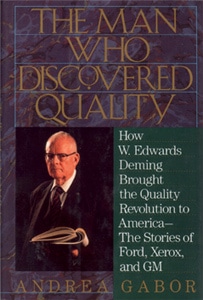By John Hunter, author of the Curious Cat Management Improvement Blog (since 2004).
In this episode of The W. Edward Deming Institute Podcast (download) Andrea Gabor begins by discussing her book The Man Who Discovered Quality: How W. Edwards Deming Brought the Quality Revolution to America – The Stories of Ford, Xerox, and GM. And then she discusses her passion for education and how to improve the education system.
She recounts Roger Smith’s attempts to use a huge investment in robots to avoid the hassle of dealing with union workers. Of course this is not the mindset of a Deming company would take. Deming saw the people of the company as an enormous resource.
If you have “dead wood” (employees you see as more harmful than useful to the company) look not to those you call “dead wood” but what is wrong with your organization that is hiring or creating dead wood.
At Ford, very importantly, the CEO, Don Peterson, invited Deming into Ford and so the changes at Ford were driven completely from the top. Needless to say once Peterson left, again here is the power of culture, things were back to that very finance mindset.
In contrast GM didn’t have senior executive commitment. There were great efforts for years around GM that did many good things, but those efforts were isolated instances of some people trying to improve while the overall management system continued on the long troubled path we still see today.
He [Dr. Deming] had tremendous respect for ordinary workers and that respect was recipricated. There was real humanity there.
This is one of the points I think is very important and missed by many who don’t have a deep understanding of Dr. Deming’s work. He was willing to “speak truth to power” (as Andrea says) and challenge the practices leaders engaged in. This ran counter to the culture that “revered CEOs” (again as Andrea says).
In some world views if you are willing to challenge power you must then feel nothing about steam rolling those without much power. I think this leads some to think if Dr. Deming didn’t show CEOs the “respect” they were used to (obedience without question, freedom from having to defend their beliefs etc.) that meant he wouldn’t show others the respect they deserved, but often didn’t get. But that wasn’t the case. Dr. Deming had great respect for workers trying to do their best within systems that were extremely frustrating.
You need people who are close to the process to identify both problems and opportunities for improvement
Andrea packs with great thoughts; listen to the whole podcast, if you haven’t already.
On education she provides insight into the serious problems with current education “reforms” in the USA and provides suggestions on how to actually improve education.
The reform agenda is really misguided, its stunning it is misguided on almost every front. For one thing you have the carrot and stick incentives, by this relentless testing regime… management by fear by tests and greades, utter absurdity that no child will be left behind… endless waivers… top down hierarchical structure…
Andrea will present, What Education Reformers Can Learn from the Deming Philosophy, at the 2014 Deming Institute Fall Conference to be held October 16-19, 2014 in Los Angeles, California.
Subscribe to the Deming podcasts via rss or iTunes.
Related: Deming Podcast #3: David Langford on Improving Education – Deming Library Video with Dr. Deming Discussing the 14 Points – Thinking Required, Not Just a Recipe to Follow – Psychology, Managing Human Systems



